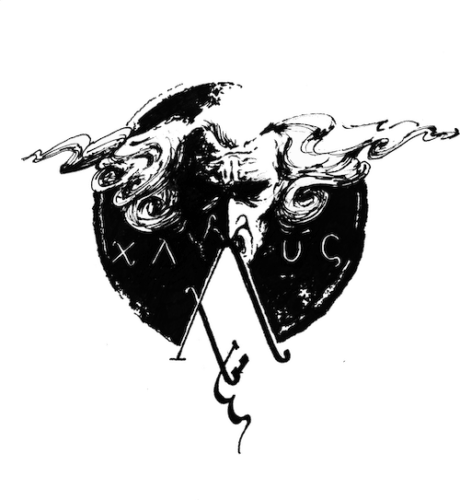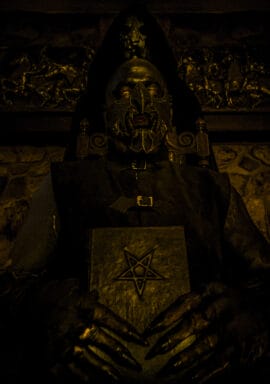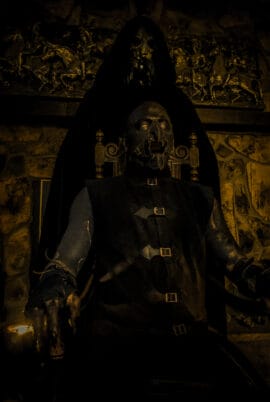Black metal is meant to sound scary. Nevertheless, only a few bands have managed to create such a frightening album as AKHLYS did with „Melinoë“ which was released at the end of 2020. On this occasion, we conducted an interview with the head of the band, who performs under the pseudonym Naas Alcameth. In his answers to our questions, the musician and songwriter explains, among other things, why his numerous musical projects are, in his view, unfittingly lumped together, what fascinates him about black metal and dark ambient, and how the COVID pandemic affected the creation of „Melinoë“.

You run quite a few black metal projects such as AKHLYS, Nightbringer, Aoratos and Bestia Arcana. However, despite their differences in lyrical themes, these projects are perceived by some as sounding quite similar. Why is it nevertheless important for you to have multiple outlets?
Of course there will always be some stylistic similarities shared between bands whose compositions are handled by the same person. It is quite difficult to escape one’s own style after all. With that said, I do not believe that my projects all sound like the same band. The variation and differentiation isn’t solely thematic. For example, I would not try to pass off a Bestia Arcana track as Nightbringer as that would be a very abrupt change in vibe, approach and overall style really. Having multiple projects within black metal is nothing novel. If anything, it is a tradition within the genre. It is interesting how this seems to legitimately bother some individuals or they see it as pointless and unnecessary. If you take this mindset and apply it to another creative vocation, say, authoring fiction, then it might give one a better idea of the perspective I am coming from with regards to all of this. Why is Stephen King’s „It“ not „The Shining Part II“? It has the same distinct writing style that marks it as King, and yet, it absolutely isn’t and can not be „The Shining Part II“ regardless of the number of stylistic hallmarks shared between the two. The stories they tell (subject matter), atmosphere, „voice“ and overall the spirit between each of these is very much it’s own. Really, anyone who believes that all of my projects sound the same likely isn’t listening very closely.
Your projects are characterized by a distinctive style that is exceptionally sinister even by black metal standards. Where does your penchant for this darkness come from?
I would say it is simply an innate inclination and one that I have attempted to refine over the many years that I have been doing this. There are many facets in black metal that appealed to me since the beginning. Black metal can so aptly capture a diverse spectrum of powerful emotions. It can relay a sense of grandness, the epic and majasterial, or the feelings of contemplative melancholy, solitude or utter despair. All of these appeal to me greatly, and I make use of many of these emotions in my writing I believe, but at the heart of it all, what draws me the most is the truly sinister, the atmosphere of complete and utter darkness, which has a tendency to be less definable, more ineffable and alien, but when you experience it it you know it for exactly what it is.
Religious and mythological references run through all your projects. Why do themes like these play such a big role in your art?
These are things that play a big part in my life so it is only natural that my music becomes the mode of expression for my thoughts, feelings and experiences based upon my own spiritual inclinations and delvings. Mythology consists of symbolism and this type of symbolism is the language used by the ancients to speak of the divine. Conceptions of the divine can never be relayed by regular, discursive language, so it stands to follow that the language of myth is the proper language when speaking of these things. In other words, the language of myth is the language of the gods.
 When writing songs, do you always plan exactly which project each song is for, or do you decide that more intuitively?
When writing songs, do you always plan exactly which project each song is for, or do you decide that more intuitively?
I only focus on one project at any one given time typically. I get obsessed by the concepts and ideas I have begun to gather for that specific album and let that inspire the overall atmosphere as I begin to compose. It usually unfolds quite naturally from there until it is finished.
Does it sometimes happen that you get writer’s block? And if so, what do you do about it?
Absolutely. I think it is important to only attempt to approach an album once you feel completely inspired to do so. You cannot force it or it will not take on a life of its own, it will be cold, dead and soulless. If I am feeling a vacancy as far as inspiration I know that it will inevitably return and usually by way of reading, personal studies, nature, so on.
You often include dark ambient pieces in your albums. I suppose this kind of music is different from the typical black metal scheme in that you probably can’t just build a song on a certain riff or something like that. How do you approach your ambient pieces?
You are absolutely correct. When I compose dark ambient it is all about feel, vibe, atmosphere, so on, and in large, letting go. The juxtaposition between this approach and the highly structured approach of the black metal riffs makes for an interesting and unique dichotomy I believe and only further strengthens the definition to the identity of the band overall.
While your first album „Supplication“ was still mostly dark ambient, on „The Dreaming I“ you moved towards black metal. How did this new direction come about?
It is not something I gave much thought beforehand truthfully. It just felt like a natural direction and projection really. Sort of like the effuse and vague spirit taking form until fully manifest. Metamorphic stages so to speak, from phantasm to incarnation.
Some listeners seem to draw connections between your music and their experiences with phenomena like sleep paralysis or night terror. Have you experienced such sleep disorders yourself?
That is no surprise given such phenomena is central to AKHLYS. Yes, I have experienced this and other related parasomnia since I was a small child. These experiences and my interpretations of them are the foundation of AKHLYS.
 Your new album „Melinoë“ is named after a nymph from the underworld of Greek mythology – a figure that is certainly not familiar to everyone. How did you become aware of her myth and what intrigued you about it?
Your new album „Melinoë“ is named after a nymph from the underworld of Greek mythology – a figure that is certainly not familiar to everyone. How did you become aware of her myth and what intrigued you about it?
I came across this figure while reading The Orphic Hymns. What little there is written about her struck a chord with me as her attributes resonate with the very things that comprise the spirit of the band. She is connected to the underworld, Hecate, and more importantly there appears to be a strong connection to fear and nightmares. Like the figure of AKHLYS, which I named the band after, Melinoe seems yet another fitting „mask“ for the spirit behind it all.
I have the impression that „Melinoë“ is a bit more straightforward and homogeneous than your previous releases. Was this intended by you and if so, for what reason?
There was no premeditation on these sorts of things. Once I began writing it all quickly took a life of its own. This is usually a sign that things are moving in the right direction, an inspired state of mind, and I let it carry me along, so to speak.
The title of the previous album „The Dreaming I“ suggests that there was another album planned to follow it. Why did you choose to focus on a different theme with „Melinoë“ instead?
That is an incorrect reading of the title actually although this is a very easy and common mistake. It is “The Dreaming I”, as in the possessive reference to one’s self, not as a Roman numeral.
 Some reviewers seem to consider „Melinoë“ a very fitting conclusion to such a ghastly year as 2020. Did the events of this year affect the making of the album?
Some reviewers seem to consider „Melinoë“ a very fitting conclusion to such a ghastly year as 2020. Did the events of this year affect the making of the album?
Absolutely. I found myself in very dire and challenging circumstances at the close of 2019, circumstances that removed me from my normal day to day life. I spent much of this time in solitude with a lot of time to reflect, read and write. Coming out of this the whole COVID situation started and so I then found myself inside my home day after day for months. It was a very surreal time, which many can relate to. During the onset of this is when I decided it was time for the next AKHLYS. The strangeness of my situation, the world, the surrealness, the tension and anxiety that inevitably triggered many dreams, it all was a sign for me personally. Because of the quarantine scenario I was also able to let myself get lost within the obsession of the vision far more than ever before. I worked on the album for a period of five months and tracked nearly every night, often until dawn, then spent an additional month in Flatline Studio mastering it with Dave Otero. None of this would have been possible if it weren’t for the world circumstances. Like the albums before, Melinoe arose via time and place, another „lightning in bottle“ creation.
How are you personally coping with the still tense situation concerning the pandemic?
I would say that I am adjusting to the state of the world, COVID and beyond, but that much of this is not so surprising to me.
Do you already have further plans for the near future of AKHLYS or any of your other projects?
I do indeed. More on that in time.
Finally, I’d like to go through a short brainstorming session with you. What comes to your mind about the following terms?
The human mind: Mirror of the Universal Mind.
Your album that you are most proud of: Melinoe.
Conspiracy theories: Only a fool believes in them all. Only a fool dismisses them all.
Classical music: An inspiration.
Your most recent dream: A storm in a cloudless summer sky.
Escapism: All things in moderation. A largely abused term.
Thanks again for the interview. Would you like to say a few final words to the readers?
Life is a dream forgotten in the slumber of death.
Dieses Interview wurde per E-Mail geführt.
Zur besseren Lesbarkeit wurden Smilies ersetzt.
